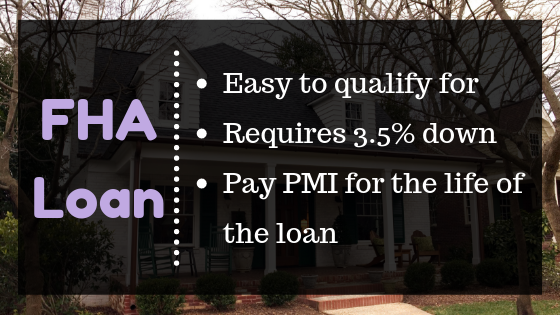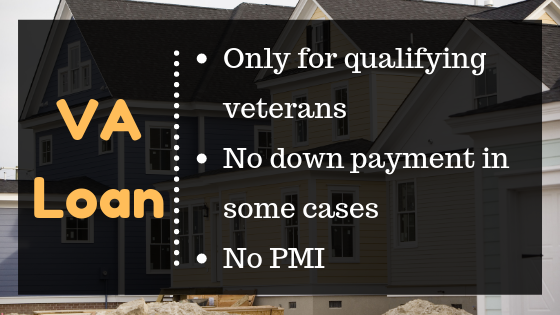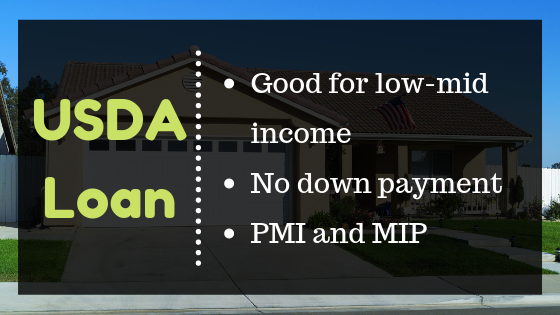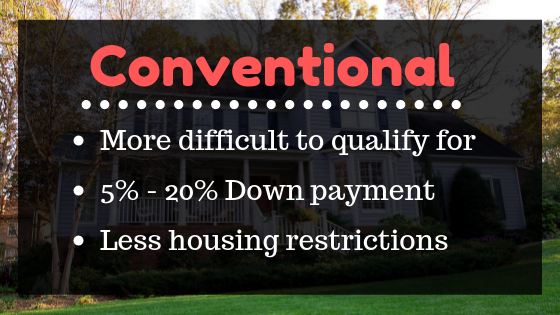There are many types of mortgages available. What's the difference between a conventional loan and an FHA loan? USDA? VA? Learn what's best for you?
I found myself unexpectedly house shopping this month (long story), and even for someone who works in the financial industry, there were plenty of terms I was unfamiliar with. One of the most confusing steps in the home buying process was understanding the different types of mortgages available. After a lot of late night spent researching the different types of mortgages available, I was finally about to make my choice, but I'll save that for the end.
Are there different types of mortgages?
Absolutely. But lets start with a couple of basic mortgage terms you will want to be familiar with before starting out on your own mortgage shopping experience. Understanding these terms is important
because the differences in these areas are what makes each type of mortgage loan unique.
-
Interest rate/APR - An interest rate, or APR, is what it will cost you to borrow money over the duration of the mortgage loan.
-
Closing costs - These are extra fees that are charged when you buy a home. They can be between 2% - 5% of the total mortgage amount.
-
Down payment - This is a minimum amount of cash you have to pay upfront to secure the loan. It is usually expressed as a percentage of the total cost of the house.
-
Qualifications - These are the different criteria you need to meet in order to be eligible for a type of loan. These involve areas like your financial history, mortgage amount, house location, and any unique personal circumstances.
-
PMI/MIP - When you borrow money (a loan) and don't put much money down (a downpayment), you will be charged a little extra each month as insurance. Mortgage Insurance Premium, or MIP, is an upfront payment while Private Mortgage Insurance, or PMI, is a recurring monthly payment.
Now that we've got that out of the way, let's dive into the four most common types of mortgages available to homebuyers today.
FHA loan

An FHA loan is a mortgage type that is popular with first time homebuyers because they are easy to qualify for (you can qualify with bad credit), requires a low down payment (3.5%), and typically have low closing costs. The Federal Housing Administration (FHA) works with approved lenders by providing them insurance against the risk of the homeowner defaulting. Since the lender has reduced their risk, they can offer you a better deal.
Even though FHA loans are easy to qualify for, there are some disadvantages. Their interest rates are sometimes higher and you could be stuck paying mortgage insurance for the life of the loan. Both of these additional costs add up to paying dramatically more over the term of the loan.
-
Loan qualifications: You must be 18+, have verifiable steady employment, a maximum 43% debt-to-income ratio, and intend on living in the residence.
-
Down payment: If your credit score is 580+ then you can put down as little as 3.5%. If your credit score is lower (500 - 579) then you will need 10%. One thing that makes FHA loans unique is the fact that 100% of the downpayment can be a gift from a friend or family member, so long as they too meet the FHA loan qualifications. There are also downpayment assistance programs like SETH, TDHCA, and TSAHC.
-
Approval amounts: These amounts vary depending on which county you're in.
-
Loan rates: FHA loan rates vary depending on the county and market rates.
-
Insurance: FHA requires both upfront and annual mortgage insurance. (Remember, that's PMI and MIP) for all borrowers, regardless of the amount of down payment. These additional costs are what can make an FHA loan expensive over the course of the loan term.
VA loan

Like FHA loans, VA loans are loans that are backed by a governmental agency: This time it's Veteran Affairs. Because it's a government-backed loan, lenders are more likely to offer favorable terms, like a competitive interest rate and no downpayment. To be eligible for a VA loan, you must be a current or former soldier, who served 90 consecutive days in wartime or 181 consecutive days in peacetime, or 6-years of National Guard service. In order to qualify for a $0 downpayment, you must also have good credit.
An important element of understanding VA loans is understanding the idea of "entitlements." An entitlement is how much money the VA will guarantee to lenders in case you default. Put another way, it's how much of your mortgage is backed by the VA. The size of your entitlement will often determine how much home you can afford (lenders typically approve mortgages that are up to 4x the amount of the entitlement).
There two types of VA Loan entitlements: basic and secondary. The basic entitlement is $36,000 and the secondary entitlement is $77,275. Qualifying for both means you have a total entitlement of $113,275.
-
Loan qualifications: You must have 90 consecutive days of wartime service, 181 consecutive days of peacetime service, or 6-years of National Guard service. Lenders will also look at more traditional measures like credit score, debt ratio, and employment.
-
Down payment: With a VA loan, you can put as little as $0 down. If the mortgage amount exceeds $453,100, then you will need to make a down payment.
-
Approval amount: There are many factors that will determine how much you get approved for, one of the main ones is how much of a guarantee you're eligible for. Generally, your approval amount with be 4x the amount of your guarantee.
-
Loan rates: Consistently lower than other loan types.
-
Insurance: VA loans don't require PMI, but they do require a 2.15% upfront funding fee.
USDA loan

A USDA loan is another mortage loan type that is a great option for low-to-medium income households looking to live in rural areas. Now, rural doesn't mean living in the middle of nowhere. Over 97% of the country is classified as rural. To obtain a USDA loan, you must be looking at housing in a qualified area, and you meet certain income requirements.
If you're a first-time homebuyer, then you might qualify for $0 downpayment. The USDA loan, when compared to an FHA loan, has a lower PMI. That said, there are regional limits that cap the mortgage amount that you can be approved for. Oh, and by the way, USDA stands for United States Department of Agriculture.
-
Loan qualifications: You (the borrower) must meet certain income requirements and the property must be in one of the qualified areas. Your income requirements will vary depending on the county you live in. The home must be your primary residence.
-
Down payment: USDA loans do not require down payments, but you will still need to cover closing costs. Mortgage closing costs are the fees a borrower pays. They're typically about 3-5% of your loan amount and are usually paid at closing (hence the name).
-
Approval amount: Each county has an approval amount limit. For example, I am writing this from Fort Bend County and the limit is $210,800. South of here in Galveston County, the limit is $199,400.
-
Loan rates: Vary depending on your credit score and the mortgage lender.
-
Insurance: USDA loans require an upfront insurance payment (MIP) equal to 1% of the home loan and then an annual payment (PMI) of 0.35% of the loan. Even with these, your insurance costs for a USDA loan are typically lower than those of an FHA loan.
Conventional loan

One of these things is not like others. So far, all the loans we have discussed are backed by a government agency. Conventional loans are not. Agency-backed loans are easier to qualify for, but depending on your financial history, you might find a better deal with a conventional loan.
Or, you might have to consider a conventional loan depending on the type of property you are interested in. Other loans have location or quality requirements, where a conventional mortgage loan can be used for a wide range of homes, including rental investment properties.
One of the main reasons conventional loans can be a smarter financial decisions is because, unlike the FHA loan, your PMI disappears when you reach 78% loan-to-value or if you put 20% down.
- Loan qualifications: The borrower must have a minimum credit score between 620 - 640, verifiable income, and a max debt-to-income ratio of 43%.
- Down payment: 5%-20%, a portion of which can be a gift. There are no down payment assistance programs available for conventional loans.
- Approval amount: The standard conventional loan limit $484,350 for a single-family home. However, this can be higher if you are living in a designated high-cost area.
- Loan rates: Largely dependent on your financial history and the terms of the loan. Some are fixed-rate and some are adjustable rate (often referred to as Adjustable Rate Mortgage or ARM).
- Insurance: Only necessary until you have 20% equity. PMI is cheaper than for FHA loans.
My mortgage shopping experience
All these types of mortgages have pros and cons associated with them. Finding the right one for you largely depends on a few key questions:
-
How good is your credit history?
-
How much down payment can you afford?
-
Does where you want to live rule out types of mortgages?
In my personal story, the conventional loan was the best choice. My area wasn't eligible for USDA, I am not a veteran, and based on my finances the conventional loan made more financial sense. Once you know your best option, it is time to start shopping around for lenders and securing your pre-approval letter. Along the way, make sure you seriously consider the interest rate, closing costs, downpayment, and of course the mortgage loan qualifications and insurance needs. Happy shopping!

